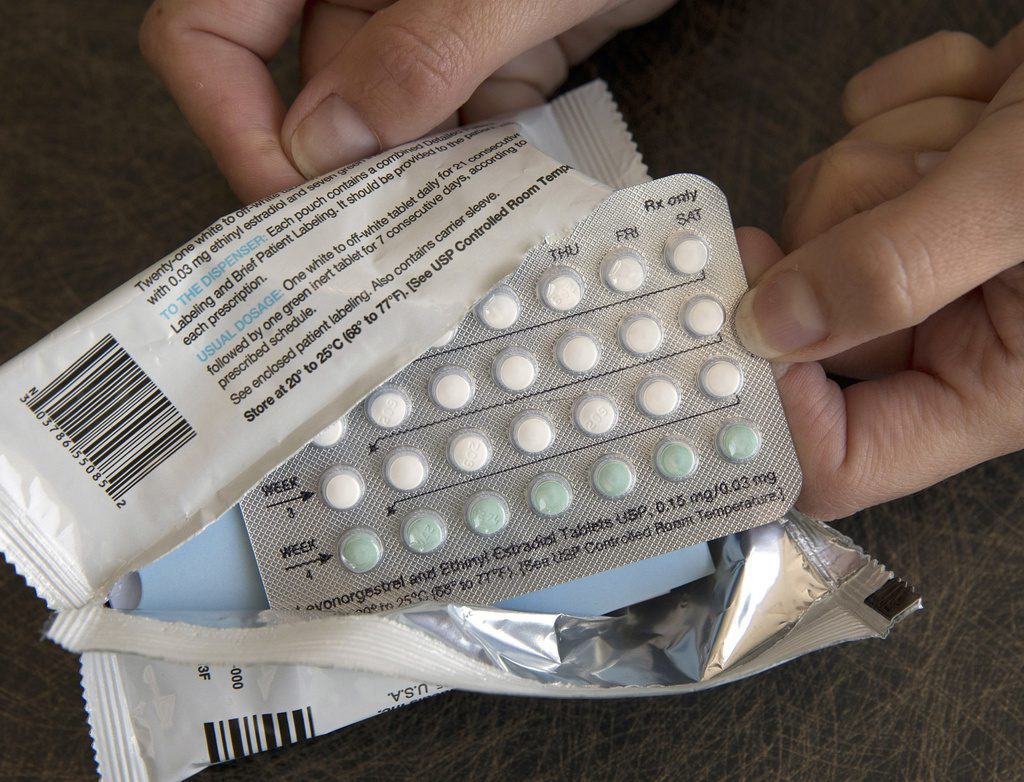
Doctors are concerned that misinformation about birth control might make some women get off it at a time when there are fewer options available for unintended pregnancies in the US. (AP Photo/Rich Pedroncelli, File)
Doctors are concerned that misinformation about birth control might make some women get off it at a time when there are fewer options available for unintended pregnancies in the US.
In a TikTok posted in August, a Tennessee woman says she uses the “fertility awareness method” of birth control, and explains her process to her thousands of followers.
Instead of relying on a proven form of birth control, she regularly tracks her temperature, tracks her menstrual cycle “religiously,” analyzes her cervical fluid, and uses at-home ovulation tests when needed to determine when she’s most likely to get pregnant during her cycle.
This, she says in the caption, is “so much easier than people make it out to be,” and she tells her followers in the post to “not stress out,” because “it’s not as hard to avoid pregnancy as people say it is.”
Although “fertility awareness methods” can indeed help indicate when a woman is more likely to conceive, this approach isn’t nearly as effective as medical birth control. In fact, as many as 1 in 4 women who use fertility awareness methods in a typical fashion — meaning they sometimes use it incorrectly or inconsistently — will become pregnant after one year of relying on the methods.
Despite the riskier nature of these sorts of pregnancy prevention methods, videos such as these are a dime a dozen on TikTok, which has become a hotbed for misinformation regarding birth control. Videos in which women blame their IUDs for everything from liver failure to autoimmune conditions have amassed millions of views and comments.
In other videos, women throw out their birth control pills in favor of “cycle tracking” with an Oura ring, a fitness tracking device that primarily allows users to track their sleep and physical activity.
The same phenomenon is happening on Instagram. A quick search for “birth control” yields dozens of videos in which women blame their hormonal birth control for their depression and anxiety and their struggles with infertility.
On YouTube, there are videos titled “How birth control destroyed a generation of women,” and on X, users are asking each other to share “all-natural” birth control methods and theorizing about how long-term partners avoid pregnancy without using condoms.
The proliferation of misinformation and lies surrounding birth control on social platforms has doctors increasingly concerned that some women might get off of contraception at a time when there are fewer options available for unintended pregnancies in the US.
Dr. Jenny Wu, an OB-GYN resident at Duke University told Salon that the sorts of videos spreading on social media can make patients more hesitant to try birth control, which has a wide variety of medical uses beyond preventing pregnancy. For example, both IUDS and birth control pills are used to treat the symptoms of endometriosis, heavy periods, and fibroids.
Many videos attack the hormones present in birth control pills, which tend to come in two forms: combination pills, in which both estrogen and progestin are present, and progestogen-only pills (also known as minipills). These videos claim that these hormones are bad for the female body, even though both estrogen and progestogen naturally exist within it, and progestin is simply a synthetic version of the latter.
Some of these videos go so far as to say that birth control pills can lead to infertility or cause miscarriages, even though there is no medical evidence that suggests the pills lead to either.
Misinformation worries medical professionals
There are OB-GYNs on TikTok, including Portland-based Dr. Jennifer Lincoln and Jacksonville-based Dr. Staci Tanouye, who are hard at work combating this misinformation for their millions of followers.
Tanouye has a whole playlist of videos on her profile in which she goes over the basics of the different birth control methods and debunks myths surrounding them. However, they are swimming against the ever-growing current of misinformation and negativity surrounding birth control.
In a study Wu published earlier this year in Obstetrics and Gynecology, she found that TikTok videos tagged with #IUD often leaned more negative than positive, and nearly all of them discussed pain or other side effects.
Another study published in Health Communications in September found that women who interacted with these negative posts reported intentions to stop using birth control, which suggests that these posts do in fact have an influence on viewers, according to study author Emily Pfender, an associate fellow at the Leonard Davis Institute of Health Economics.
“My experimental research shows that when people perceive an influencer to be more credible, both with having greater expertise and trustworthiness, they’re more likely to intend to use a less effective, nonhormonal method,” Pfender told Salon.
The latest guidelines from the American College of Obstetricians and Gynecologists (ACOG), also say that misperceptions and “exaggerated concerns about the safety of contraceptive methods are major barriers to contraceptive use.”
A brief history of the birth control pill
Despite birth control’s dark origins of being tested on low-income Puerto Rican women, birth control pills have been widely credited as being a key to the women’s liberation movement.
Before the 1960s, when they were introduced, it was quite difficult for women to have control over their fertility, which resulted in unwanted pregnancies and limited their life options. Birth control pills have only gotten safer since their initial launch, and now, they have six decades of proven contraceptive efficacy.
The safety of the pill has also improved as medical professionals have identified which conditions make taking the pill dangerous — such as high blood pressure, cardiovascular disease, and diabetes — and steered women with those conditions away from the medication.
Both types of birth control pills prevent pregnancy when used properly, but the FDA stresses the importance of taking the minipill at the same time every day in order for it to be most effective.
While it’s true that combination pills do carry a slightly elevated risk for blood clots and stroke, and some studies have linked hormonal birth control to an elevated risk of breast cancer, other studies have shown that hormonal birth control can actually reduce the risk of both endometrial and ovarian cancers.
Research also shows that virtually all American women of reproductive age have used some form of birth control in their lives.
According to an analysis by The New York Times, prescriptions for birth control pills increased by roughly 7% nationwide between 2018 and 2023. Today, 14% of women between the ages of 15 and 49 in the US are on the birth control pill and about 10% have an implant or IUD, according to data from the Centers for Disease Control and Prevention (CDC).
Despite the safety and increasing use of contraception, many women report not being informed of the risks of birth control pills or the IUD. In a 2022 study conducted by KFF, a health policy research and news organization, just 30% of women reported that they were adequately informed of all of the risks regarding their chosen form of birth control before getting on it.
This lack of information can lead women to distrust the medical system, and perhaps turn towards social media to learn more, according to Dr. Jonas Swartz, an OB-GYN at Duke University, who also spoke with Salon. He said that what’s important to keep in mind, however, is that those who post about their experiences with birth control are also more likely to have had an extreme experience, whether that be positive or negative.
“When I was a resident, people were more often getting this information from friends and relatives,” he said. “I think the difference now is that people see these anecdotal bad experiences on social media and those play heavily into their decision-making.”

People are leaving states with abortion bans, according to study
A new analysis from the National Bureau of Economic Research found that since 2022, states with near-total abortion bans appear to have lost 36,000...

The fight for reproductive justice in Florida is ‘not over,’ say advocates
"We're going to ensure that our voices are heard," says Charo Valero of the National Latina Institute for Reproductive Justice, who spoke with...

5 places in Florida to donate clothes, shoes, and more
Decluttering your home can provide such a satisfying feeling of accomplishment. After sorting through all of your belongings and determining what...

8 Orlando hotels that pack as much fun as the theme parks
With waterslides, family arcades, playgrounds for the kids, and spas for mom and dad, these Orlando hotels will make your vacation unforgettable!...



